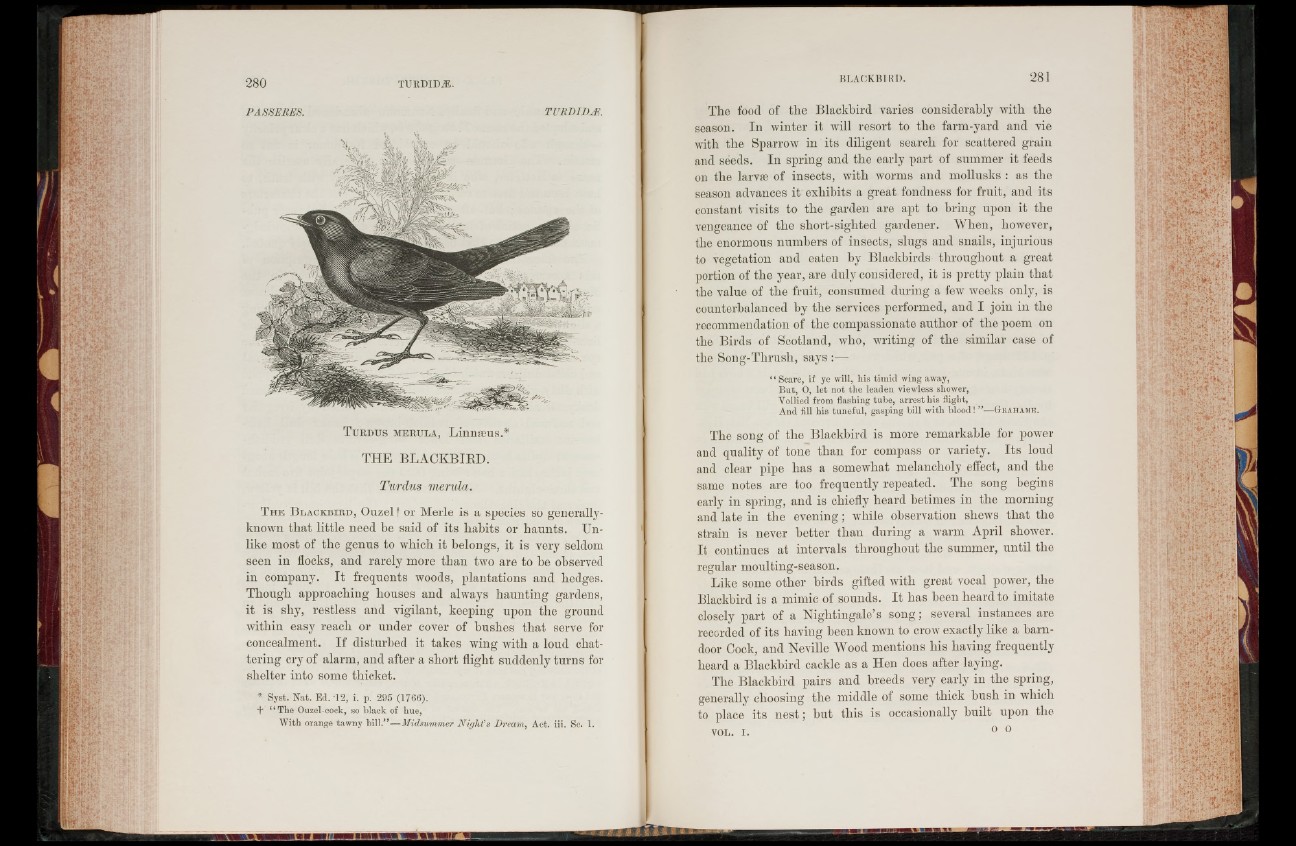
PASSERAS. TURDIDÆ.
TUEDUS MERULA, LillllieUS.*
THE BLACKBIRD.
Turdus merula.
The Blackbird, Ouzel t or Merle is a species so generally-
known that little need be said of its habits or haunts. Unlike
most of the genus to which it belongs, it is very seldom
seen in flocks, and rarely more than two are to he observed
in company. It frequents woods, plantations and hedges.
Though approaching houses and always haunting gardens,
it is shy, restless and vigilant, keeping upon the ground
within easy reach or under cover of hushes that serve for
concealment. If disturbed it takes wing with a loud chattering
cry of alarm, and after a short flight suddenly turns for
shelter into some thicket.
* Syst. Nat. Ed. "12, i. p. 295 (1766).
+ “ The Ouzel-cock, so black of hue,
With orange tawny bill.”— Midsummer Night's Dream, Act. iii. Sc. 1.
The food of the Blackbird varies considerably with the
season. In winter it will resort to the farm-yard and vie
with the Sparrow in its diligent search for scattered grain
and seeds. In spring and the early part of summer it feeds
on the larvas of insects, with worms and mollusks : as the
season advances it exhibits a great fondness for fruit, and its
constant visits to the garden are apt to bring upon it the
vengeance of the short-sighted gardener. When, however,
the enormous numbers of insects, slugs and snails, injurious
to vegetation and eaten by Blackbirds throughout a great
portion of the year, are duly considered, it is pretty plain that
the value of the fruit, consumed during a few weeks only, is
counterbalanced by the services performed, and I join in the
recommendation of the compassionate author of the poem on
the Birds of Scotland, who, writing of the similar case of
the Song-Thrush, says :—
“ Scare, if ye will, his timid wing away,
But, 0, let not the leaden viewless shower,
Yollied from flashing tube, arrest his flight,
And fill his tuneful, gasping bill with blood! ”—Gkahamk.
The song of the Blackbird is more remarkable for power
and quality of tone than for compass or variety. Its loud
and clear pipe has a somewhat melancholy effect, and the
same notes are too frequently repeated. The song begins
early in spring, and is chiefly heard betimes in the morning
and late in the evening; while observation shews that the
strain is never better than during a warm April shower.
It continues at intervals throughout the summer, until the
regular moulting-season.
Like some other birds gifted with great vocal power, the
Blackbird is a mimic of sounds. I t has been heard to imitate
closely part of a Nightingale’s song; several instances are
recorded of its having been known to crow exactly like a barndoor
Cock, and Neville Wood mentions his having frequently
heard a Blackbird cackle as a Hen does after laying.
The Blackbird pairs and breeds very early in the spring,
generally choosing the middle of some thick hush in which
to place its nest; but this is occasionally built upon the